After seeing endless screencaptures on Twitter, I decided to dive into Legend of the Galactic Heroes out of curiosity for something people seemed to universally praise. I usually gravitate to classics for a reason: they’re usually safe choices when it comes to spending my time.
For those unfamiliar with the series, it’s a space opera with a heavy emphasis on all sides of the conflict. Both sides of the war have their share of side-plots, intrigue and political maneuvering, while neutral forces look to capitalize on the conflict. It’s also very much sold (at least by social media) as ahead of its time for a late-80s anime, with character depth and plot development that dwarf others. I feel like I’m insulting it by simplifying it to “space Game of Thrones,” but I see the appeal for mainly the same reasons: morally grey characters, political sabotage and corruption, and how ideology shapes people.
As I’m watching the series, I wanted to write about how I’ve found it on an episode-by-episode basis; I figured I’d do it here. These posts will not be observing any spoiler rules, so you’ve been warned. I’ll be marking certain concepts with bold text and coloring to keep track of important people/factions.
| # | Episode Name | Original Air Date | Focus | Wiki Link | Watched Version |
|---|---|---|---|---|---|
| S01E01 | “In the Eternal Night” | 1988/12/21 | Establishing Context | [LINK] | Central Anime |
◄ See previous episode | See next episode ►
What interested me about LOGH was both its portrayal of war and the systems that allow it to thrive in this universe. On one side, you’ve got the autocratic Galactic Empire, and on the other, the democratic Free Planets Alliance. Both are suffering from corruption and change within their borders while dealing with a greater conflict externally; I like that “on the home front” kind of switch, and the series emphasizes that life doesn’t stop for war. I like that nuance because it usually leads to stronger character moments and a richer setting.
This isn’t exactly one of those back-and-forth episodes because it’s got a lot of stuff to do. “In the Eternal Night”‘s purpose is to set up our universe, how it operates, and to tell us what we can expect. Ideally, we want to meet our characters, see some settings, and learn about the main driving conflict.
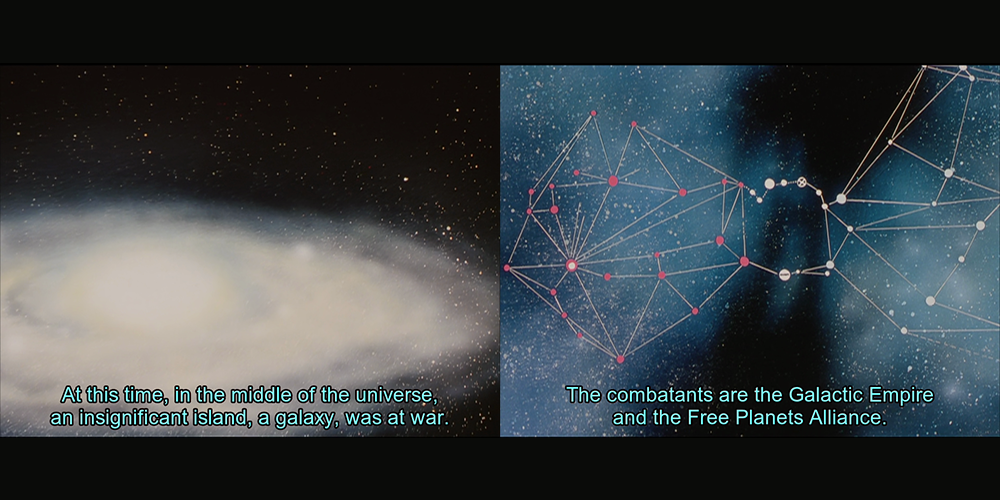
What I liked about this episode is that it does a good job of establishing tone, as well as all that. We learn not only about the in-universe concepts of setting and functions, but the external concepts of what the directors want to achieve, and how they say things.
We learn that there is no clear division of “good guys” and “bad guys,” at least at the start. We also learn that despite the Free Planets Alliance being posited as “good guys” by the viewer (democracy, woo!), that doesn’t preclude people at high levels of politics and military from being utterly incompetent. Seeing the massacres of the 4th and 6th fleets because of short-sighted officers sets the standard that tactics in this universe matter, and we’re going to see a lot of them.
The Battle of Astarte (January 796 UC) makes for an interesting setting for this, because the episode’s tactics come from two places of defiance: Reinhard von Lohengramm (Lohengramm Fleet, Empire) faces his subordinates calling his decisions into question, while Yang Wen-Li (2nd Fleet, FPA) must deal with seeing the results of leadership turning down his combat plans. We also meet Jean Robert Lapp (6th Fleet FPA), who attempts to speak truth to a very unwilling commanding officer who is blinded by honor and revenge.
Yang and Reinhard form our two protagonists, and seeing them on the opposite sides of the conflict are interesting from the get-go. Reinhard is seemingly very familiar with Yang, and elevating him to a mythical status through brooding lines build him up for the viewer. Because we primarily see Yang as a weary, aloof soldier underneath many layers of military command, we’re waiting alongside Reinhard for the legend to appear.
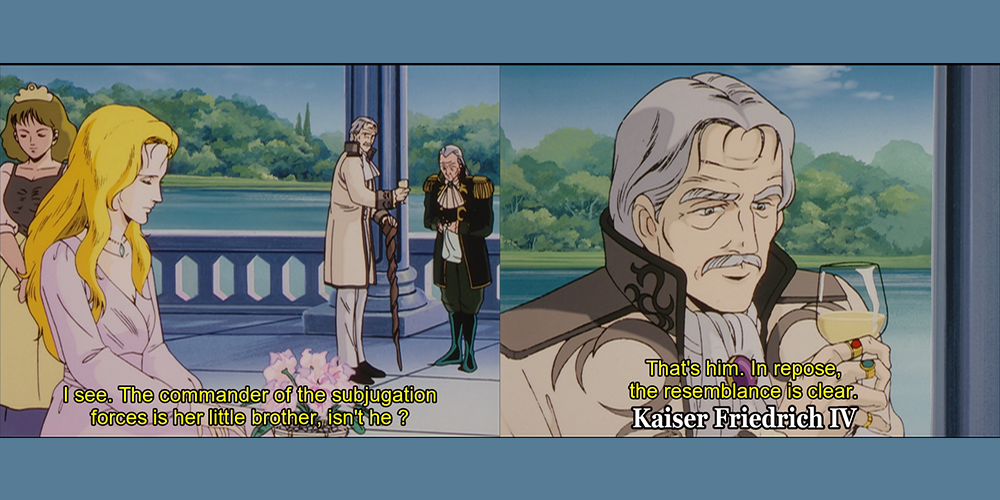
We also get a brief view of the home away from the war, meeting Reinhard’s sister, Annerose von Grünewald. We also meet Kaiser Friedrich IV, and that gives us a clear look at the structure of the Empire; there are rich living in relative opulence while the conflict rages. The Kaiser and Annerose are in the episode a comparatively small amount, but this exchange sets up a lot of the future.
This episode illustrates the cold realities of this world: incompetent higher-ups will get you killed, and blind pride, honor and vengeance mean nothing in the face of superior force. There is no shounen-esque “defying all odds,” here. Reinhard’s strategy allows for the FPA to lose two fleets when simply joining them together would have a numerical advantage; the speed of travel in space and the loss of communication turns out to be their undoing. The episode closes out with Lapp meeting an unfortunate end as the 6th fleet joins the 4th fleet in destruction; the commanders of each fleet ensured their demise with simplistic thinking, overconfidence, and the inability to be flexible.
Lapp is the martyr that the viewer needs in order to enter a mindset while watching. He serves the same role as Eddard Stark in that he dies before fulfilling what his purpose was “supposed to be”, and the viewer must deal with that. We feel the loss of potential, and the affect it will have on Yang. As I’ve watched ahead of these reviews, I can say that the Yang/Lapp duality is particularly entertaining because it shows the chaos of what this war actually is: brutal, uncaring and definite.
Sometimes, you go out like a bitch because your commanding officer is an idiot. This is life in space.
Points of note:
This section is mainly going to deal with moments I found interesting, separate from the main post.
The rank-and-file
I really liked this section with two gunners (?) who explain some of the world that they’re living in: you’re usually not going to live through a successful enemy attack, bionic limbs (or at least braces) are possible, and there are ways of commuting the amount of sleep needed to function in war.
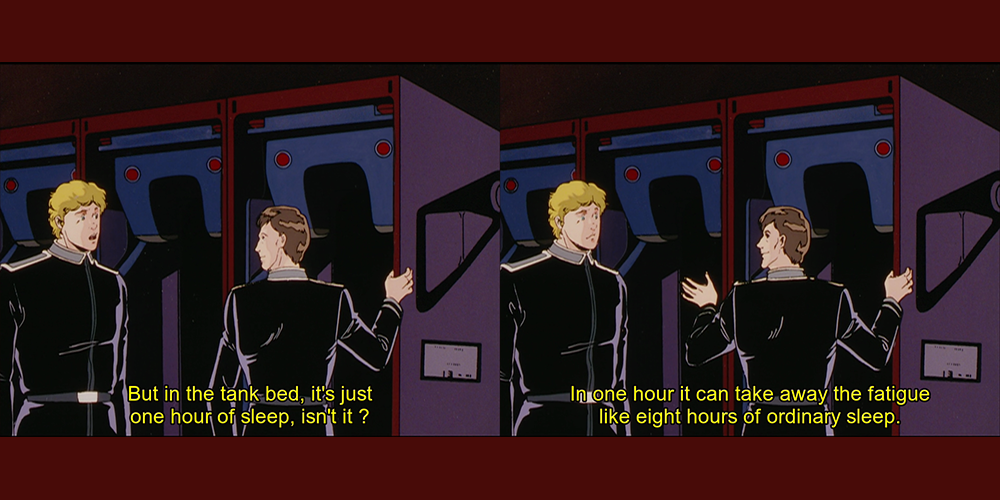
This exchange is nice as a whole, because they seem to be aware of their rank and what it means in the greater scheme of things. The Empire are not the Star Wars Empire, and these soldiers aren’t Stormtroopers.
They realize the horrors of what’s going on around them, and just like the FPA pilot during this episode, they realize it might be somewhat of a benefit to die immediately and (relatively) painlessly. Even sleep is being taken away from them, and the respite that dreams might give.
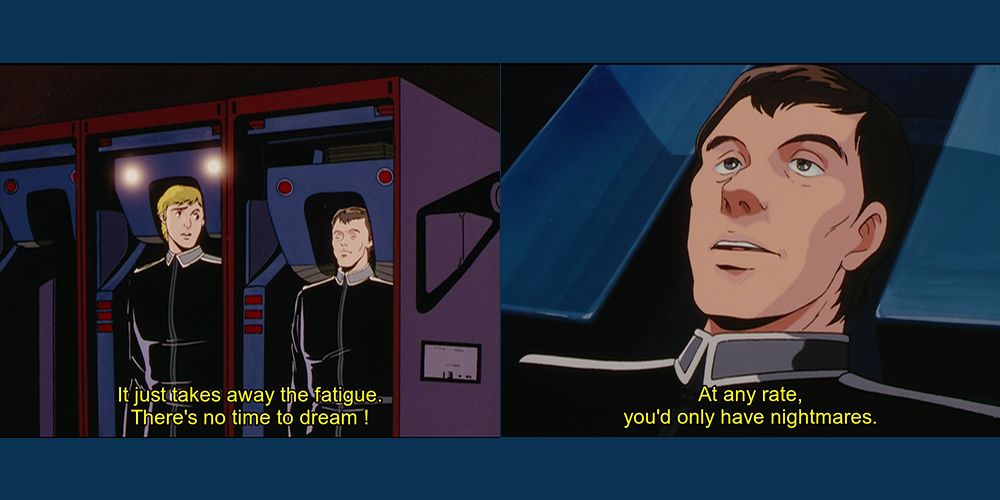
Lapp’s downfall
“The truth is very unpleasant!” is a nice bookend to Lapp’s life, as his commanding officer’s pride is what leads them to their doom. We want to scream at the incompetence we see on-screen, as the next sequences are pretty much “too bad, man.”

Lapp’s death illustrates the vulnerability of the characters, but it also serves to set up plot points down the road; we learn much about him without him being alive to take part in that development. His “Yang, don’t end up like this” illustrates stakes for the viewer: Yang is a protagonist, but he is vulnerable to not only his mistakes, but the mistakes of others out of his control. This introduces a huge degree of tension to all the battles in the series.

Lapp ends up having an immense influence on Yang’s life despite us never seeing them interact in this episode. We meet Jessica (albeit briefly), which will come into play later. We are reminded that love exists in this universe. Ironically, though, Lapp’s lamenting that he is going to fade into nothingness is wrong. His death and who he is as a person influences many more events to come.

Ships and graphical fidelity
LOGH makes choices on where to spend its budget; for every static-but-mouth-moving dialog shot, you’ll see animated sequences of battles that look pretty great for 1988. The ships look utilitarian and lack a certain flair (well, unless we count Lohengramm’s flagship, the Brünhild, which shows up in the intro and in the episodes themselves).
I like that there’s kind of this conflict between old and new with the aesthetic; the Empire really echoes European high society with its uniforms and civilian dress, and yet we have hovercars, video phones and lasers. The FPA has its own regulated style, but aside from the commanding officer uniform (and the beret) the greys and greens of their ships make them look a little less regal.
We’re also shown fighter ships and how they’re essential to what otherwise is essentially pre-trench warfare, with armies lining up and shooting each other. I get the feeling that that will fade, though, since we’re given more of a zoomed-out view of how movement, flanking and support matter to the overall flow of battle.
I think this is a pretty solid start to the series because it gives people little threads of things to get excited about. We want to see how Yang will survive the problems of the Battle of Astarte, and we also want to see how his actions will continue to impress Reinhard. We also get key establishing of themes for later episodes; Kircheis (who I purposefully didn’t go into in this review) and Reinhard’s conversation about the stars will come up numerous times in the future.
Aside from this character work, I left this episode thinking in some simple terms: who’s going to be a dick next? What’s even the point of them being here? Does it make sense to get invested in all these side characters? Does a subtitle in the anime mean you’re important?
Basically, it made me want to watch more, and any good “episode 1” should do that.
◄ See previous episode | See next episode ►
While I admit that I am a talentless hack, if you liked this post, consider contributing some tea money on Ko-Fi.
Matt Demers writes about video games, culture and the Internet. You can find him on Twitter, Facebook, and Instagram. You can watch him stream on Twitch.

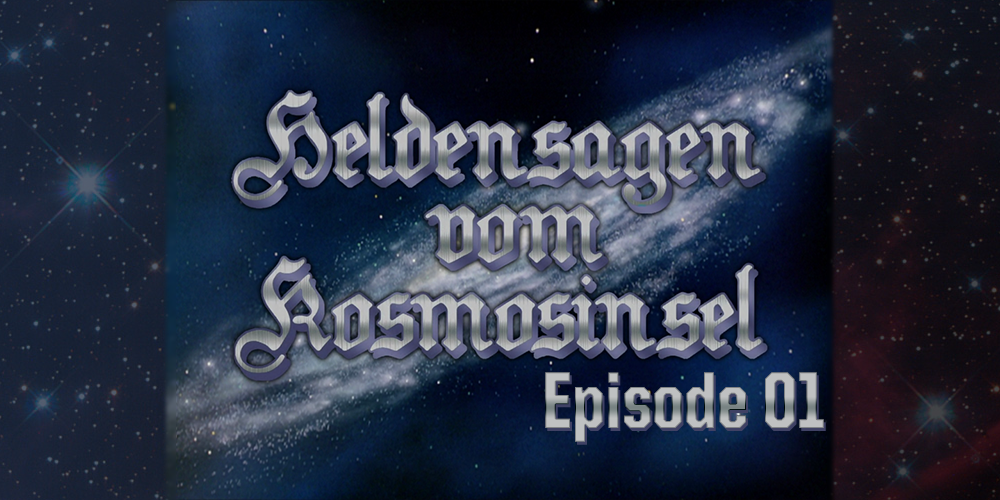
Leave a Reply